SEO
Top 14 SEO Podcasts For 2023

Podcasts offer a way to explore a wide range of SEO-related topics.
Typical podcast subjects are search marketing news, strategies, career advancement, and personal growth.
SEO is constantly evolving, with new algorithms and seismic changes, such as the front-end integration of AI.
Podcasts offer the busy SEO professional an easy way to keep up with the latest news and trends and not be left behind.
The following SEO podcasts were chosen for their helpfulness, their regular publishing schedule, and their focus on helping search marketers and agencies thrive.
Host: Loren Baker
The Search Engine Journal Show covers the full spectrum of search marketing. It discusses SEO strategies and marketing tactics, exploring the future of programmatic and evolving content trends.
Top search marketing professionals worldwide share their experiences and knowledge with host Loren Baker.
Recent shows covered these topics:
If you’re new to the Search Engine Journal Show, you’re in for a treat because there are hundreds of episodes to listen to.
Listen to new episodes on Apple Podcasts, Google Play, Spotify, and TuneIn.
Hosts: Tazmin Suleman and Sarah McDowell
I’ve listened to and enjoyed the SEO Mindset podcast. Its two hosts cover topics related to SEO career development.
Recent shows spotlighted cultivating good habits and conquering bad ones, overcoming fear of failure, and a very interesting episode with Mordy Oberstein about how to push back to make good things happen at work.
This episode (Pushing Back with Mordy Oberstein) is a fine representation of how the podcast creatively handles its topics. Pushing Back is about avoiding becoming overwhelmed and how pushing back can help keep a company on track to accomplishing goals.
Hosts Tazmin and Sarah reliably publish an episode weekly, and they are looking forward to future episodes in 2023.
I asked Sarah about the origins of the podcast and what listeners should expect from it.
Sarah shared:
“Whilst there are amazing SEO podcasts out there, Tazmin and I saw that there aren’t many that just focus on soft skills, personal growth, and career development.
Yes, some touch on these topics, but we definitely saw an opportunity to create a podcast that solely focuses on giving SEO professionals actionable tips and advice, so they can optimize their careers, not just the algorithms. Cheesy tagline, but true!
We’ve already covered so many important topics that often don’t get talked about such as burnout, anxiety, imposter syndrome, work/life balance, self-belief, mindset etc., and with around 30 episodes, we’ve only scratched the surface.
There’s many more topics to be explored and spoken about.
We’re four seasons in, had amazing guests, and we’ve received great feedback from listeners saying how much they get out of episodes.
Our listeners are not all SEO professionals. As we talk about topics that are relevant to all industries, we just try and relate them back to SEO with real-life examples.
Go on and give some of our episodes a try!”
Listen to the SEO Mindset Podcast at Amazon Music, Apple, Google Podcasts, Spotify, and Pocket Casts.
Host: Shelley Walsh
SEO Pioneers is video series (with podcast coming soon) documenting the early days of SEO through the recollections of many who were there.
The guests are all pioneers who helped to shaped the industry at its formation, or contributed in a significant way.
Along the way, there are some amazing anecdotes, like when a company chairman asked Michael Bonfils to find good companies to invest in, and Michael discovered a small company called Google that nobody had heard about yet.
Michael tells the chairman to invest in Google, but then, of course, the chairman knows better, and you can probably guess what happens next.
Walsh interviews, amongst other, Ammon Johns, Greg Boser, Dave Naylor, Bruce Clay, John Mueller and Rae Hoffman, one of the sharpest and most successful affiliate marketers in the industry. Upcoming episodes include Brett Tabke, Barry Schwartz and Jill Whalen.
There’s also an episode with the late Bill Slawski which is the last interview he ever gave.
Every pioneer has a different story to tell with plenty of insights into the foundations of SEO, how search engines evolved and what is still relevant today.
In every episode the approach is for the pioneer to offer a unique story and also to get them to share something they have never shared in public before. Watch Dave Naylor for one of the best stories!
All episodes in this series are a winner and a must-listen for search marketers at every level. John Mueller even credited the show as ‘one to watch’ on Google Search News.
SEO Pioneers is currently available on YouTube and will soon be available as a podcast.
Hosts: Isaline Muelhauser and Areej AbuAli
The Women in Tech SEO Podcast (WTSPodcast) is a biweekly show spotlighting women in search.
Podcast episodes primarily cover technical SEO and personal development issues that are unique to workers in SEO.
It’s mostly about technical SEO, hence the show’s title, Women In Tech SEO Podcast.
Recent episodes discuss structured data, large website migrations, and an interesting take on site architecture.
I asked them last year what listeners can expect.
They replied:
- “Learn new SEO tactics in a fun and accessible way.
- Feel inspired by our guest’s stories and what empowers them.
- Stay up to date with our latest initiatives and events.”
Technical SEO is one of my favorite topics; I appreciate the clarity they bring to it. I strongly recommend giving the podcast a listen.
Listen to Women in Tech SEO on Apple Podcasts and Spotify.
Host: Andi Jarvis
The Strategy Sessions Podcast may be most useful to those at a management level of an SEO department or an agency.
The podcast features content related to performance marketing. But a significant number of the episodes are peripheral to SEO – more about running an agency and marketing to consumers.
Guests on the Strategy Sessions podcast work or have worked at companies like the BBC, Accenture, and marketing heads at tech startups.
A recent episode titled, Rebrands, People and the Future of Marketing covered:
- The challenges of working around client silos to launch new work.
- Knowing when you have enough data.
- Marketing being “more than just the wrapping paper, but about what’s inside the box too.”
- Challenges for marketers coming into a recession.
- Running a creative agency with an IT background.
- The lessons from Gillette and P&G at the start of his career.
- Building diverse teams and new thinking.
Other podcasts are about topics on how to grow an agency from 2 people to 60 people in 8 years.
Listen to new episodes at Apple, Google, and Spotify.
Hosts: Greg Finn, Jessica Budde, and Christine ‘Shep’ Zirnheld
Listen to the fresh perspectives on recent SEO and digital marketing news with the dynamic hosts of Marketing O’Clock.
Episodes in February 2023 covered news about Meta’s verification scheme, Microsoft advertising updates, AI-powered search, and whether Google is losing its mojo.
Pretty good for a podcast that started in 2018 as a way to keep clients up to date with trending SEO, PPC, and social media news.
Their podcast is released on a weekly schedule. Put it on your calendar and tune in to the latest episodes.
Listen to new episodes on Apple, Stitcher, and Spotify.
Host: Jim Hedger and Dave Davies
Webcology is a regularly published podcast covering current events in the world of SEO.
Guest hosts discuss evergreen topics like domains, conversions, link building, and everything else to do with search marketing.
Jim Hedger is a Toronto-based search marketer with over 25 years of experience working on the Internet, and Dave Davies is the owner and CEO of Beanstalk Internet Marketing with 20+ years of SEO experience.
Their wide-ranging curiosity keeps them in touch with current events; further, they can tell you where the currents of events are taking the search industry.
If you only listen to one SEO podcast a week, Webcology should be at the top of your list.
Listen to new episodes on Apple, Google Podcasts, Spotify, and RedCircle.
Host: Jason Barnard
Search marketer Jason Barnard publishes one of the most actionable SEO podcasts on the Internet.
Virtually every episode is jampacked with strategies related to search marketing. This makes his Branded Search (and Beyond) podcast a perfect listen every Tuesday.
Every episode contains evergreen content, meaning there are five years’ worth of actionable discussions to listen to.
Recent topics include:
- Conversion-Driven SEO for Consistent Results.
- How to Leverage Press to Build Authority on Google.
- Building a Personal Brand Online With a Book.
- How to Create Content That Converts.
Jason publishes a new episode every week.
Available on Apple Podcasts and Spotify.
Search Off the Record is an informal podcast by many SEO-facing Googlers.
Topics range from a behind-the-scenes look at how Google Search Central documentation is developed to a light discussion of algorithms.
Two factors make Google’s podcast notable:
- Variety: The podcast is different from anything else focused on the business of search.
- Authoritative source: Because it’s from Google – that’s a compelling reason to tune in.
The podcasts aren’t all related to technical SEO and don’t help one become a better search marketer.
But the podcast does help understand where Google’s coming from.
Available on Apple Podcasts, Google Podcasts, and Spotify.
Host: Bjork Ostrom
The Food Blogger Pro podcast is focused on helping food bloggers achieve greater success.
What’s interesting is that, while the focus is on food bloggers, the topics cross over to publishers in any other topic.
Recent topics demonstrate how broadly the topics apply to virtually any kind of information publishing business:
- Building relationships and improving SEO with email marketing.
- Understanding taxes for independent creators.
- Transitioning from publishing an informational site to an ecommerce business.
- Creating a paid newsletter income stream.
- Diversifying income and growth strategies.
Listen to the podcast on Apple, Google Podcasts, and Spotify.
Host: David Bain
RankRanger publishes a podcast episode every Tuesday.
Each episode features a guest discussing a search marketing topic that’s appropriate for virtually anyone who publishes a website or practices SEO – whether that’s in-house, agency, or as an independent search marketer.
Recent topics are:
- 5 Ways To Use Logfiles For SEO.
- Five Tips To Optimize Your Google Business Profile.
- How To Audit Content Like An SEO Data Analyst.
- 3 Ways To Grow Your SEO Client Accounts.
Listen to the podcast on Apple, Spotify, SoundCloud, and YouTube.
Host: Erin Sparks
The EDGE of the Web podcast covers recent digital marketing news and presents guests who are well-known on Twitter.
Recent episodes in 2023 have featured Mark Williams-Cook (founder of topical keyword research tool, AlsoAsked) and Kevin Indig.
EDGE of the web publishes more than one episode a week, so it can be counted on for a fresh take on the news of the moment.
Available on Apple Podcasts, Google Podcasts, Spotify, and SoundCloud.
Hosts: Jason Davis, Jonathan Payne, Mikayla Meek, Mitch Gregory
The NerdBrand podcast is narrowly focused on brand-related topics that intersect with SEO both directly and indirectly.
While the podcast itself doesn’t directly touch on SEO, the topics are of great importance important to anyone who practices search marketing.
Recent topics include:
Available on Apple Podcasts, Spotify, and Google Podcasts.
Host: Daniel K. Cheung
Speaking of brands, The Make SEO Simple Again podcast has been rebranded as the #DreadingSundays Podcast.
#DreadingSundays is about the business of SEO and personal development.
I asked Daniel what he feels listeners will take away from the podcast:
“You know the feeling you get on Sunday where you’re like “Oh… it’s Monday again”?
It’s probably because you don’t really want to go to work and this is the premise behind #DreadingSundays – a podcast that explores actionable tips to successfully negotiate for better pay and to prepare for job interviews.
Featuring a diverse range of guests, you’ll hear from people who look like you and sound like you so that you can feel motivated and inspired to take what is rightfully yours.”
There are currently multiple seasons to listen to that are on evergreen topics, which means there are many episodes to choose from for new listeners.
The #DreadingSundays podcast is available on Apple Podcasts, Google Podcasts, and Spotify.
2023 SEO Podcast Shows
I’m excited to see new podcasts making the list this year.
The broad scope of the podcasts reflects the many kinds of topics for professionals in the search marketing community.
More Resources:
Featured Image: GBJSTOCK/Shutterstock
SEO
How to Find and Use Competitor Keywords

Competitor keywords are the keywords your rivals rank for in Google’s search results. They may rank organically or pay for Google Ads to rank in the paid results.
Knowing your competitors’ keywords is the easiest form of keyword research. If your competitors rank for or target particular keywords, it might be worth it for you to target them, too.
There is no way to see your competitors’ keywords without a tool like Ahrefs, which has a database of keywords and the sites that rank for them. As far as we know, Ahrefs has the biggest database of these keywords.
How to find all the keywords your competitor ranks for
- Go to Ahrefs’ Site Explorer
- Enter your competitor’s domain
- Go to the Organic keywords report
The report is sorted by traffic to show you the keywords sending your competitor the most visits. For example, Mailchimp gets most of its organic traffic from the keyword “mailchimp.”


Since you’re unlikely to rank for your competitor’s brand, you might want to exclude branded keywords from the report. You can do this by adding a Keyword > Doesn’t contain filter. In this example, we’ll filter out keywords containing “mailchimp” or any potential misspellings:


If you’re a new brand competing with one that’s established, you might also want to look for popular low-difficulty keywords. You can do this by setting the Volume filter to a minimum of 500 and the KD filter to a maximum of 10.


How to find keywords your competitor ranks for, but you don’t
- Go to Competitive Analysis
- Enter your domain in the This target doesn’t rank for section
- Enter your competitor’s domain in the But these competitors do section


Hit “Show keyword opportunities,” and you’ll see all the keywords your competitor ranks for, but you don’t.


You can also add a Volume and KD filter to find popular, low-difficulty keywords in this report.


How to find keywords multiple competitors rank for, but you don’t
- Go to Competitive Analysis
- Enter your domain in the This target doesn’t rank for section
- Enter the domains of multiple competitors in the But these competitors do section


You’ll see all the keywords that at least one of these competitors ranks for, but you don’t.


You can also narrow the list down to keywords that all competitors rank for. Click on the Competitors’ positions filter and choose All 3 competitors:


- Go to Ahrefs’ Site Explorer
- Enter your competitor’s domain
- Go to the Paid keywords report


This report shows you the keywords your competitors are targeting via Google Ads.
Since your competitor is paying for traffic from these keywords, it may indicate that they’re profitable for them—and could be for you, too.
You know what keywords your competitors are ranking for or bidding on. But what do you do with them? There are basically three options.
1. Create pages to target these keywords
You can only rank for keywords if you have content about them. So, the most straightforward thing you can do for competitors’ keywords you want to rank for is to create pages to target them.
However, before you do this, it’s worth clustering your competitor’s keywords by Parent Topic. This will group keywords that mean the same or similar things so you can target them all with one page.
Here’s how to do that:
- Export your competitor’s keywords, either from the Organic Keywords or Content Gap report
- Paste them into Keywords Explorer
- Click the “Clusters by Parent Topic” tab


For example, MailChimp ranks for keywords like “what is digital marketing” and “digital marketing definition.” These and many others get clustered under the Parent Topic of “digital marketing” because people searching for them are all looking for the same thing: a definition of digital marketing. You only need to create one page to potentially rank for all these keywords.


2. Optimize existing content by filling subtopics
You don’t always need to create new content to rank for competitors’ keywords. Sometimes, you can optimize the content you already have to rank for them.
How do you know which keywords you can do this for? Try this:
- Export your competitor’s keywords
- Paste them into Keywords Explorer
- Click the “Clusters by Parent Topic” tab
- Look for Parent Topics you already have content about
For example, if we analyze our competitor, we can see that seven keywords they rank for fall under the Parent Topic of “press release template.”


If we search our site, we see that we already have a page about this topic.


If we click the caret and check the keywords in the cluster, we see keywords like “press release example” and “press release format.”


To rank for the keywords in the cluster, we can probably optimize the page we already have by adding sections about the subtopics of “press release examples” and “press release format.”
3. Target these keywords with Google Ads
Paid keywords are the simplest—look through the report and see if there are any relevant keywords you might want to target, too.
For example, Mailchimp is bidding for the keyword “how to create a newsletter.”


If you’re ConvertKit, you may also want to target this keyword since it’s relevant.
If you decide to target the same keyword via Google Ads, you can hover over the magnifying glass to see the ads your competitor is using.


You can also see the landing page your competitor directs ad traffic to under the URL column.


Learn more
Check out more tutorials on how to do competitor keyword analysis:
SEO
Google Confirms Links Are Not That Important

Google’s Gary Illyes confirmed at a recent search marketing conference that Google needs very few links, adding to the growing body of evidence that publishers need to focus on other factors. Gary tweeted confirmation that he indeed say those words.
Background Of Links For Ranking
Links were discovered in the late 1990’s to be a good signal for search engines to use for validating how authoritative a website is and then Google discovered soon after that anchor text could be used to provide semantic signals about what a webpage was about.
One of the most important research papers was Authoritative Sources in a Hyperlinked Environment by Jon M. Kleinberg, published around 1998 (link to research paper at the end of the article). The main discovery of this research paper is that there is too many web pages and there was no objective way to filter search results for quality in order to rank web pages for a subjective idea of relevance.
The author of the research paper discovered that links could be used as an objective filter for authoritativeness.
Kleinberg wrote:
“To provide effective search methods under these conditions, one needs a way to filter, from among a huge collection of relevant pages, a small set of the most “authoritative” or ‘definitive’ ones.”
This is the most influential research paper on links because it kick-started more research on ways to use links beyond as an authority metric but as a subjective metric for relevance.
Objective is something factual. Subjective is something that’s closer to an opinion. The founders of Google discovered how to use the subjective opinions of the Internet as a relevance metric for what to rank in the search results.
What Larry Page and Sergey Brin discovered and shared in their research paper (The Anatomy of a Large-Scale Hypertextual Web Search Engine – link at end of this article) was that it was possible to harness the power of anchor text to determine the subjective opinion of relevance from actual humans. It was essentially crowdsourcing the opinions of millions of website expressed through the link structure between each webpage.
What Did Gary Illyes Say About Links In 2024?
At a recent search conference in Bulgaria, Google’s Gary Illyes made a comment about how Google doesn’t really need that many links and how Google has made links less important.
Patrick Stox tweeted about what he heard at the search conference:
” ‘We need very few links to rank pages… Over the years we’ve made links less important.’ @methode #serpconf2024″
Google’s Gary Illyes tweeted a confirmation of that statement:
“I shouldn’t have said that… I definitely shouldn’t have said that”
Why Links Matter Less
The initial state of anchor text when Google first used links for ranking purposes was absolutely non-spammy, which is why it was so useful. Hyperlinks were primarily used as a way to send traffic from one website to another website.
But by 2004 or 2005 Google was using statistical analysis to detect manipulated links, then around 2004 “powered-by” links in website footers stopped passing anchor text value, and by 2006 links close to the words “advertising” stopped passing link value, links from directories stopped passing ranking value and by 2012 Google deployed a massive link algorithm called Penguin that destroyed the rankings of likely millions of websites, many of which were using guest posting.
The link signal eventually became so bad that Google decided in 2019 to selectively use nofollow links for ranking purposes. Google’s Gary Illyes confirmed that the change to nofollow was made because of the link signal.
Google Explicitly Confirms That Links Matter Less
In 2023 Google’s Gary Illyes shared at a PubCon Austin that links were not even in the top 3 of ranking factors. Then in March 2024, coinciding with the March 2024 Core Algorithm Update, Google updated their spam policies documentation to downplay the importance of links for ranking purposes.
The documentation previously said:
“Google uses links as an important factor in determining the relevancy of web pages.”
The update to the documentation that mentioned links was updated to remove the word important.
Links are not just listed as just another factor:
“Google uses links as a factor in determining the relevancy of web pages.”
At the beginning of April Google’s John Mueller advised that there are more useful SEO activities to engage on than links.
Mueller explained:
“There are more important things for websites nowadays, and over-focusing on links will often result in you wasting your time doing things that don’t make your website better overall”
Finally, Gary Illyes explicitly said that Google needs very few links to rank webpages and confirmed it.
I shouldn’t have said that… I definitely shouldn’t have said that
— Gary 鯨理/경리 Illyes (so official, trust me) (@methode) April 19, 2024
Why Google Doesn’t Need Links
The reason why Google doesn’t need many links is likely because of the extent of AI and natural language undertanding that Google uses in their algorithms. Google must be highly confident in its algorithm to be able to explicitly say that they don’t need it.
Way back when Google implemented the nofollow into the algorithm there were many link builders who sold comment spam links who continued to lie that comment spam still worked. As someone who started link building at the very beginning of modern SEO (I was the moderator of the link building forum at the #1 SEO forum of that time), I can say with confidence that links have stopped playing much of a role in rankings beginning several years ago, which is why I stopped about five or six years ago.
Read the research papers
Authoritative Sources in a Hyperlinked Environment – Jon M. Kleinberg (PDF)
The Anatomy of a Large-Scale Hypertextual Web Search Engine
Featured Image by Shutterstock/RYO Alexandre
SEO
How to Become an SEO Lead (10 Tips That Advanced My Career)
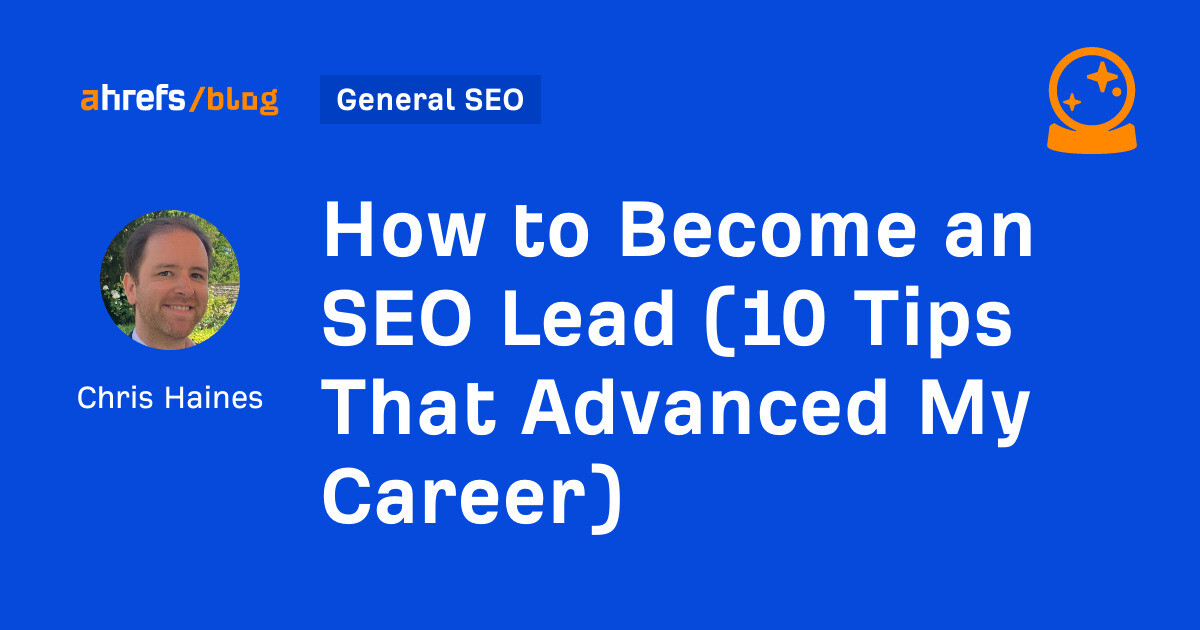
A few years ago, I was an SEO Lead managing enterprise clients’ SEO campaigns. It’s a senior role and takes a lot of work to get there. So how can you do it, too?
In this article, I’ll share ten tips to help you climb the next rung in the SEO career ladder.
Helping new hires in the SEO team is important if you want to become an SEO Lead. It gives you the experience to develop your leadership skills, and you can also share your knowledge and help others learn and grow.
It demonstrates you can explain things well, provide helpful feedback, and improve the team’s standard of work. It shows you care about the team’s success, which is essential for leaders. Bosses look for someone who can do their work well and help everyone improve.
Here are some practical examples of things I did early in my career to help mentor junior members of the team that you can try as well:
- Hold “lunch and learn” sessions on topics related to SEO and share case studies of work you have done
- Create process documents for the junior members of the team to show them how to complete specific tasks related to your work
- Compile lists of your favorite tools and resources for junior members of the team
- Create onboarding documents for interns joining the company
Wouldn’t it be great if you could look at every single SEO Lead’s resume? Well, you already can. You can infer ~70% of any SEO’s resume by spying on their LinkedIn and social media channels.
Type “SEO Lead” into LinkedIn and see what you get.
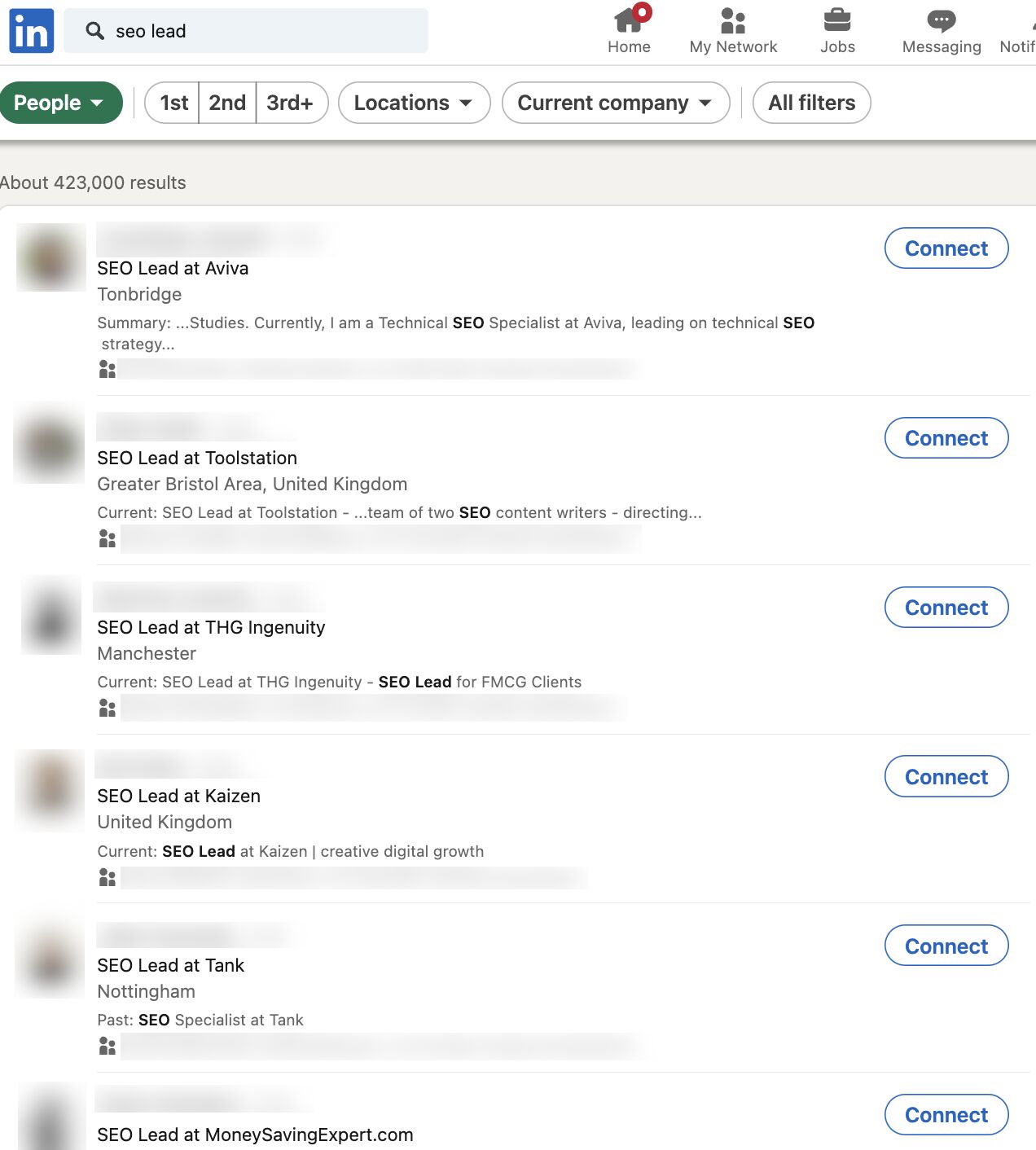
Tip
Look for common career patterns of the SEOs you admire in the industry.
I used this method to understand how my favorite SEOs and people at my company navigated their way from a junior role to a senior role.
For example, when the Head of SEO at the time Kirsty Hulse, joined my team, I added her on LinkedIn and realized that if I wanted to follow in her footsteps, I’d need to start by getting the role of SEO Manager to stand any possible chance of leading SEO campaigns like she was.
The progression in my company was from SEO Executive to Senior SEO Executive (Junior roles in London, UK), but as an outsider coming into the company, Kirsty showed me that it was possible to jump straight to SEO Manager given the right circumstances.
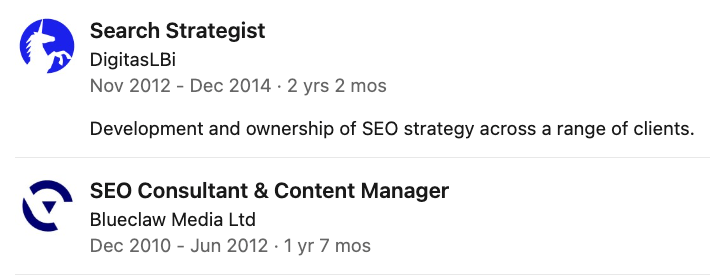

Using Kirsty’s and other SEOs’ profiles, I decided that the next step in my career needed to be SEO Manager, and at some point, I needed to get some experience with a bigger media agency so I could work my way up to leading an SEO campaign with bigger brands.
Sadly, you can’t just rock up to a monthly meeting and start leading a big brand SEO campaign. You’ll need to prove yourself to your line manager first. So how can you do this?
Here’s what I’d suggest you do:
- Create a strong track record with smaller companies.
- Obsessively share your wins with your company, so that senior management will already know you can deliver.
- At your performance review, tell your line manager that you want to work on bigger campaigns and take on more responsibility.
If there’s no hope of working with a big brand at your current job, you might need to consider looking for a new job where there is a recognizable brand. This was what I realized I needed to do if I wanted to get more experience.
Tip
Get recruiters on LinkedIn to give you the inside scoop on which brands or agencies are hiring. Ask them if you have any skill gaps on your resume that could prevent you from getting a job with these companies.
Being critical of your skill gaps can be hard to do. I found the best way to identify them early in my career was to ask other people—specifically recruiters. They had knowledge of the industry and were usually fairly honest as to what I needed to improve.
From this, I realized I lacked experience working with other teams—like PR, social, and development teams. As a junior SEO, your mind is focused 99% on doing SEO, but when you become more senior, your integration with other teams is important to your success.
For this reason, I’d suggest that aspiring SEO Leads should have a good working knowledge of how other teams outside of SEO operate. If you take the time to do this, it will pay dividends later in your career:
- If there are other teams in your company, ask if you can do some onboarding training with them.
- Get to know other team leads within your company and learn how they work.
- Take training courses to learn the fundamentals of other disciplines that complement SEO, such as Python, SQL, or content creation.
Sometimes, employers use skill gaps to pay you less, so it’s crucial to get the skills you need early on…
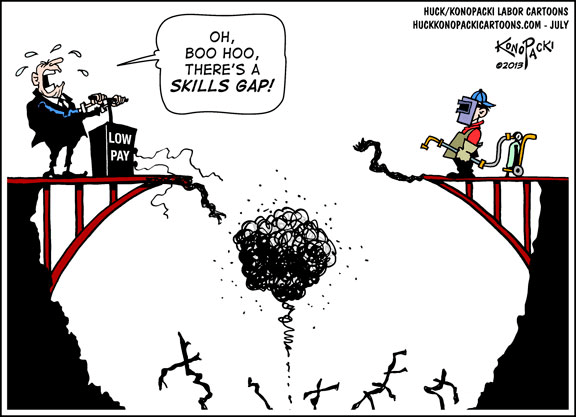

Examples of other skill gaps I’ve noticed include:
Tip
If you think you have a lot of skill gaps, then you can brush up your skills with our SEO academy. Once you’ve completed that, you can fast-track your knowledge by taking a course like Tom Critchlow’s SEO MBA, or you can try to develop these skills through your job.
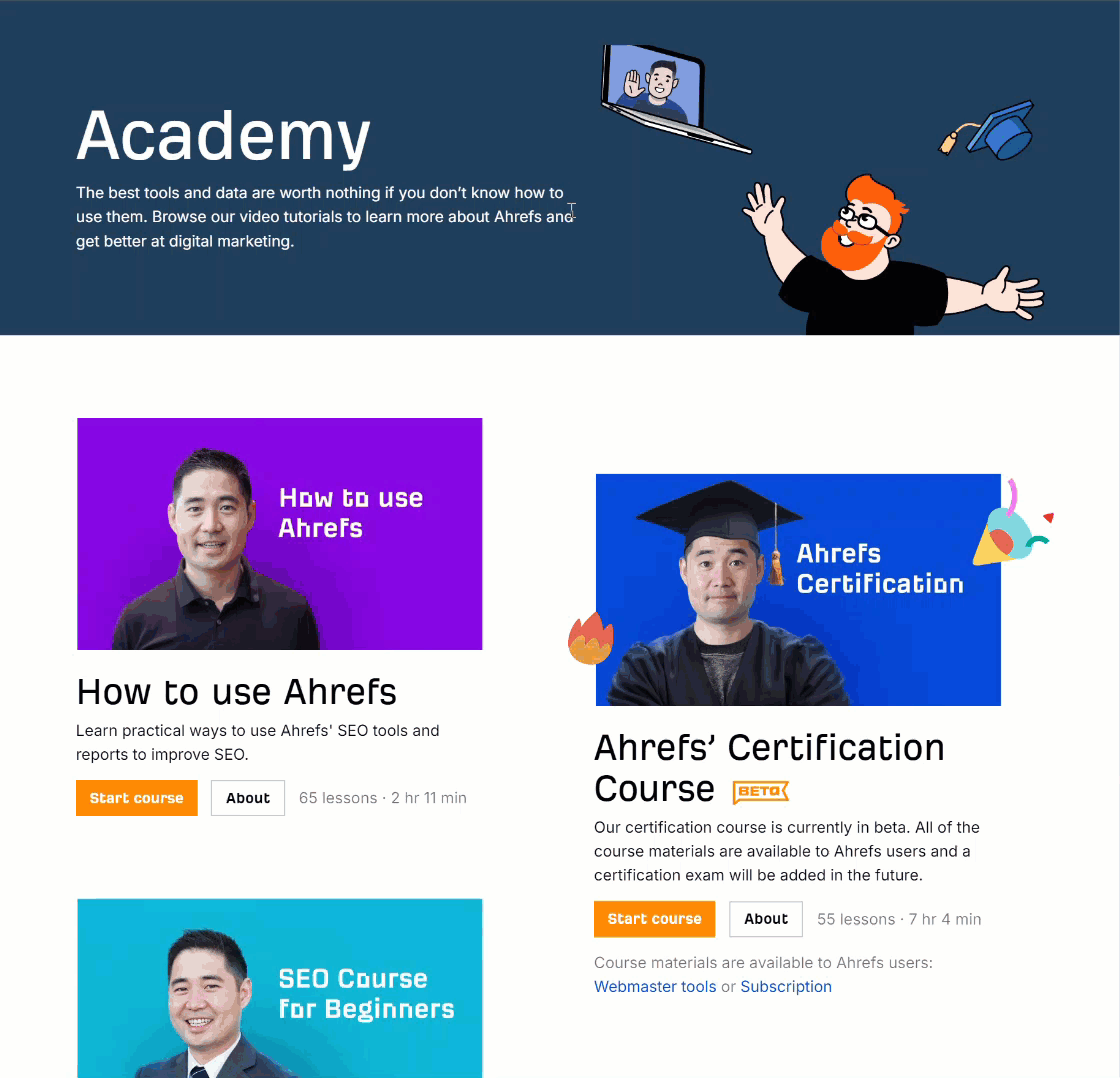

As a junior in any company, it can be hard to get your voice heard amongst the senior crowd. Ten years ago, I shared my wins with the team in a weekly group email in the office.
Here’s what you should be sharing:
- Praise from 3rd parties, e.g. “the client said they are impressed with the work this month.”
- Successful performance insights, e.g “following our SEO change, the client has seen X% more conversions this month.”
- Examples of the work you led, e.g. if your leadership and decision-making led to good results, then you need to share it.
At Ahrefs I keep a “wins” document. It’s just a simple spreadsheet that lists feedback on the blog posts I’ve written, the links I’ve earned and what newsletters my post was included in. It’s useful to have a document like this so you have a record of your achievements.
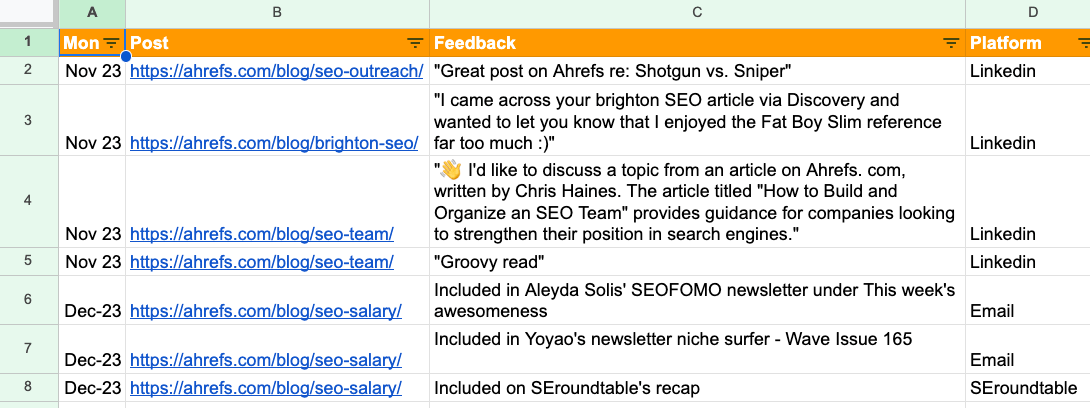

Sidenote.
Junior SEOs sometimes talk about the things “we” achieved as a team rather than what they achieved at the interview stage. If you want the SEO Lead role, remember to talk about what you achieved. While there’s no “I” in team, you also need to advocate for yourself.
One of my first big wins as an SEO was getting a link from an outreach campaign on Buzzfeed. When I went to Brighton SEO later that year and saw Matthew Howells-Barby sharing how he got a Buzzfeed link, I realized that this was not something everyone had done.
So when I did manage to become an SEO Lead, and my team won a prize in Publicis Groupe for our SEO performance, I made sure everyone knew about the work we did. I even wrote a case study on the work for Publicis Groupe’s intranet.
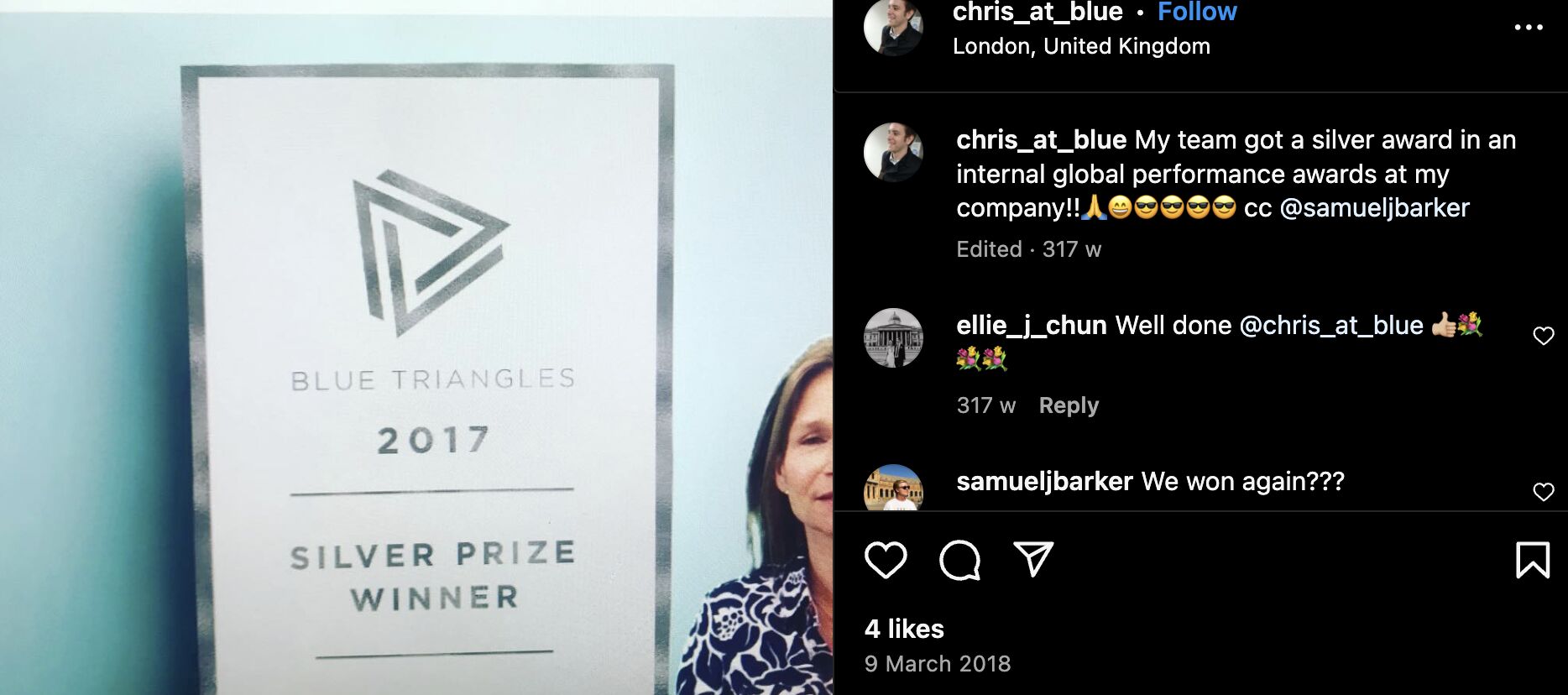

I’ve worked with some incredibly talented people, many of whom have helped me in my career.
I owe my big break to Tim Cripps, Laura Scott, and Kevin Mclaren. Without their support and encouragement, I wouldn’t be where I am today. Even before that, David Schulhof, Jodie Wheeler, and Carl Brooks let me mastermind some bonkers content campaigns that were lucky enough to succeed:


I wasn’t even an SEO Lead at that point, but they gave me the reins and trusted me.
So, how can you find your tribe?
- Speak to recruiters – they might hold the ticket to your next dream job. I spoke to many recruiters early in my career, but only two recruiters delivered for me—they were Natasha Woodford, and Amalia Gouta. Natasha helped me get a job that filled my skill gap, and Amalia helped me get my first SEO Lead role.
- Go to events and SEO conferences, and talk to speakers to build connections outside of your company.
- Use LinkedIn and other social media to interact with other companies or individuals that resonate with you.
Many senior SEO professionals spend most of their online lives on X and LinkedIn. If you’re not using them, you’re missing out on juicy opportunities.
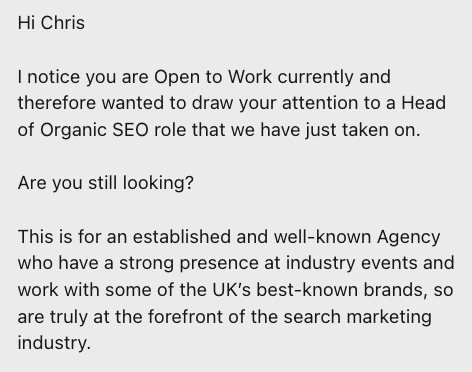

Sharing your expertise on these platforms is one of the easiest ways to increase your chances of getting a senior SEO role. Because, believe it or not, sometimes a job offer can be just a DM away.
Here’s some specific ideas of what you can share:
- Share your thoughts on a trending topic – like the latest Google algorithm update.
- Share what you learned during the course of a campaign.
- Ask the community for their thoughts on a certain topic.
I’ve recently started posting on LinkedIn and am impressed by the reach you can get by posting infrequently on these topics.
Here’s an example of one of my posts where I asked the community for help researching an article I was writing:
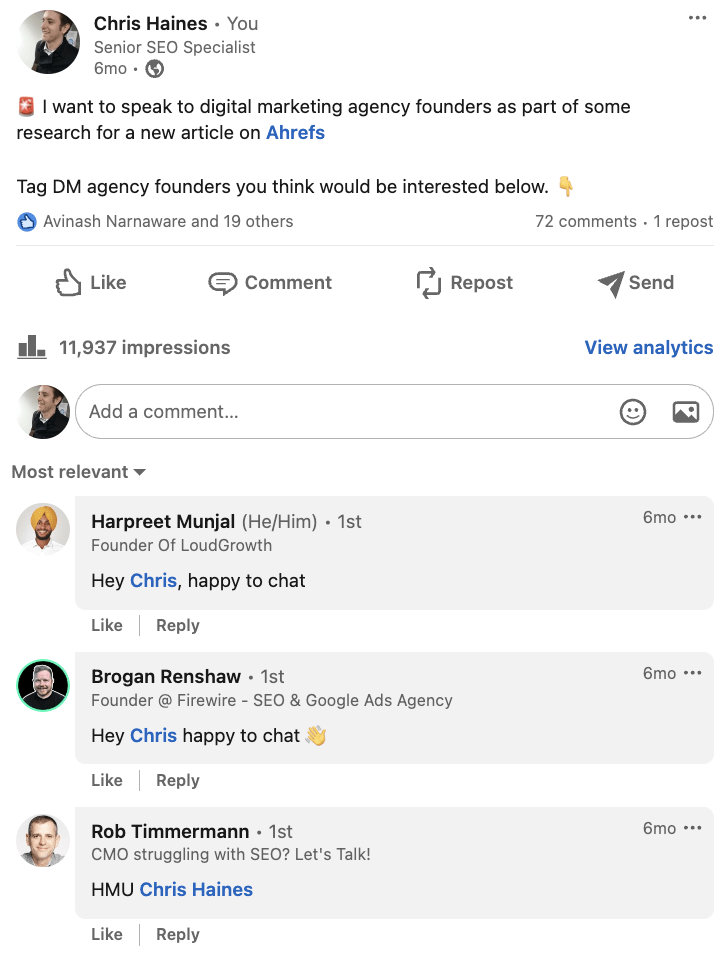

And here is the content performance across the last year from posting these updates.
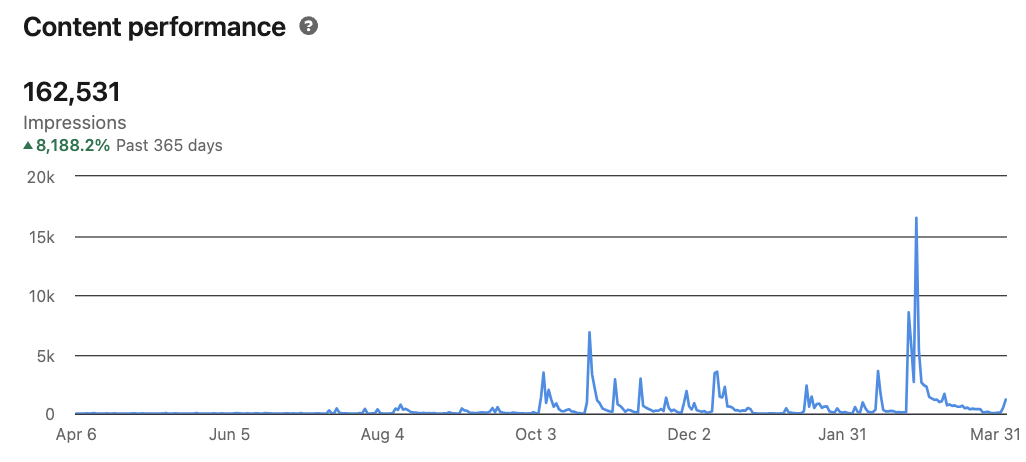

I’m clearly not a LinkedIn expert—far from it! But as you can see, with just a few months of posting, you can start to make these platforms work for you.
Godard Abel, co-founder of G2, talked on a podcast about conscious leadership. This struck a chord with me recently as I realized that I had practiced some of the principles of conscious leadership—unconsciously.
You can start practicing conscious leadership by asking yourself if your actions are above or below the line. Here are a few examples of above and below-the-line thinking:
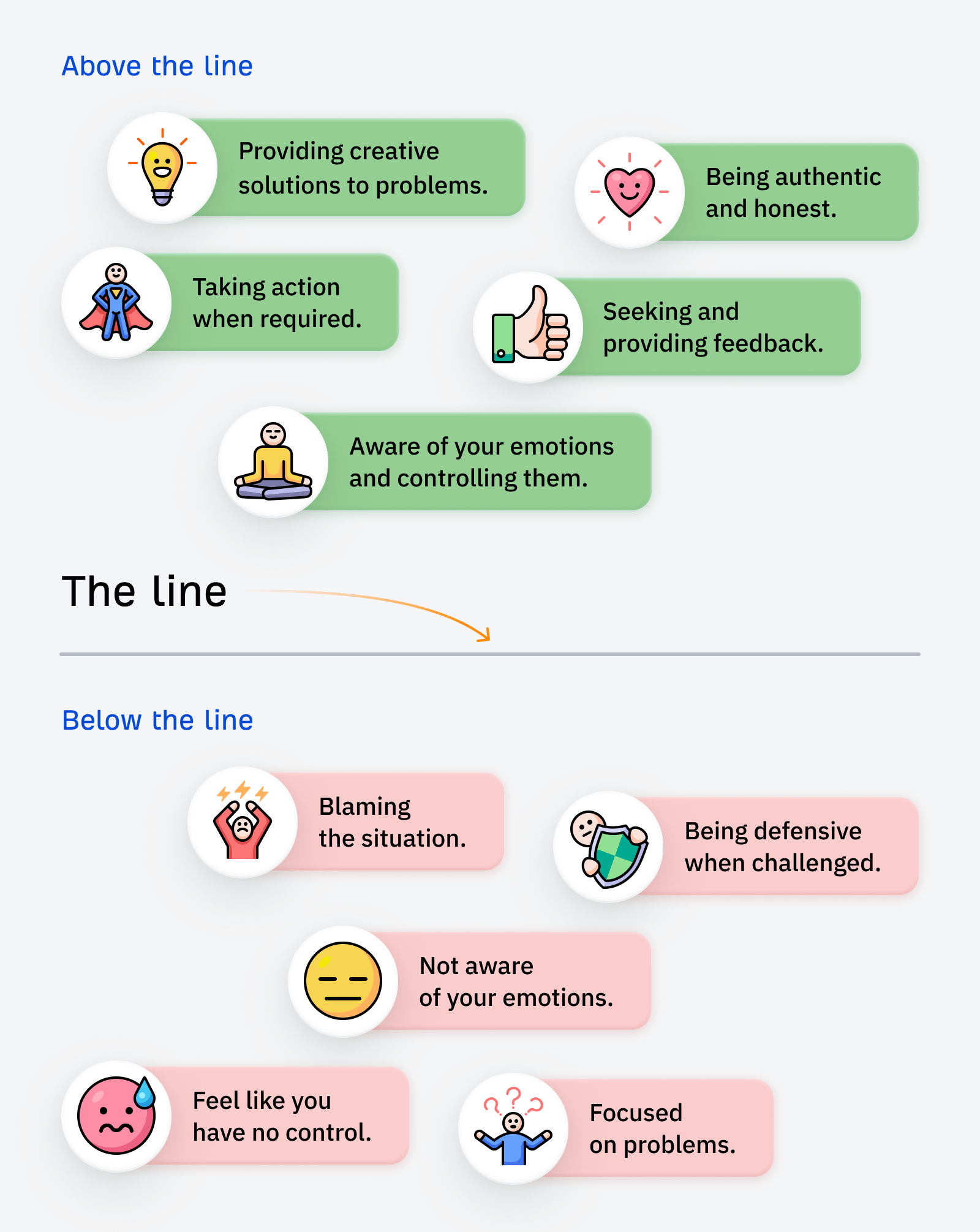

If you want a senior SEO role, I’d suggest shifting your mindset to above-the-line thinking.
In the world of SEO, it’s easy to blame all your search engine woes on Google. We’ve all been there. But a lot of the time, simple changes to your website can make a huge difference—it just takes a bit of effort to find them and make the changes.
SEO is not an exact science. Some stakeholders naturally get nervous if they sense you aren’t sure about what you’re saying. If you don’t get their support early on then you fall at the first hurdle.


To become more persuasive, try incorporating Aristotle’s three persuasive techniques into your conversations.
- Pathos: use logical reasoning, facts, and data to present water-tight arguments.
- Ethos: establish your credibility and ethics through results.
- Logos: make your reports tell a story.
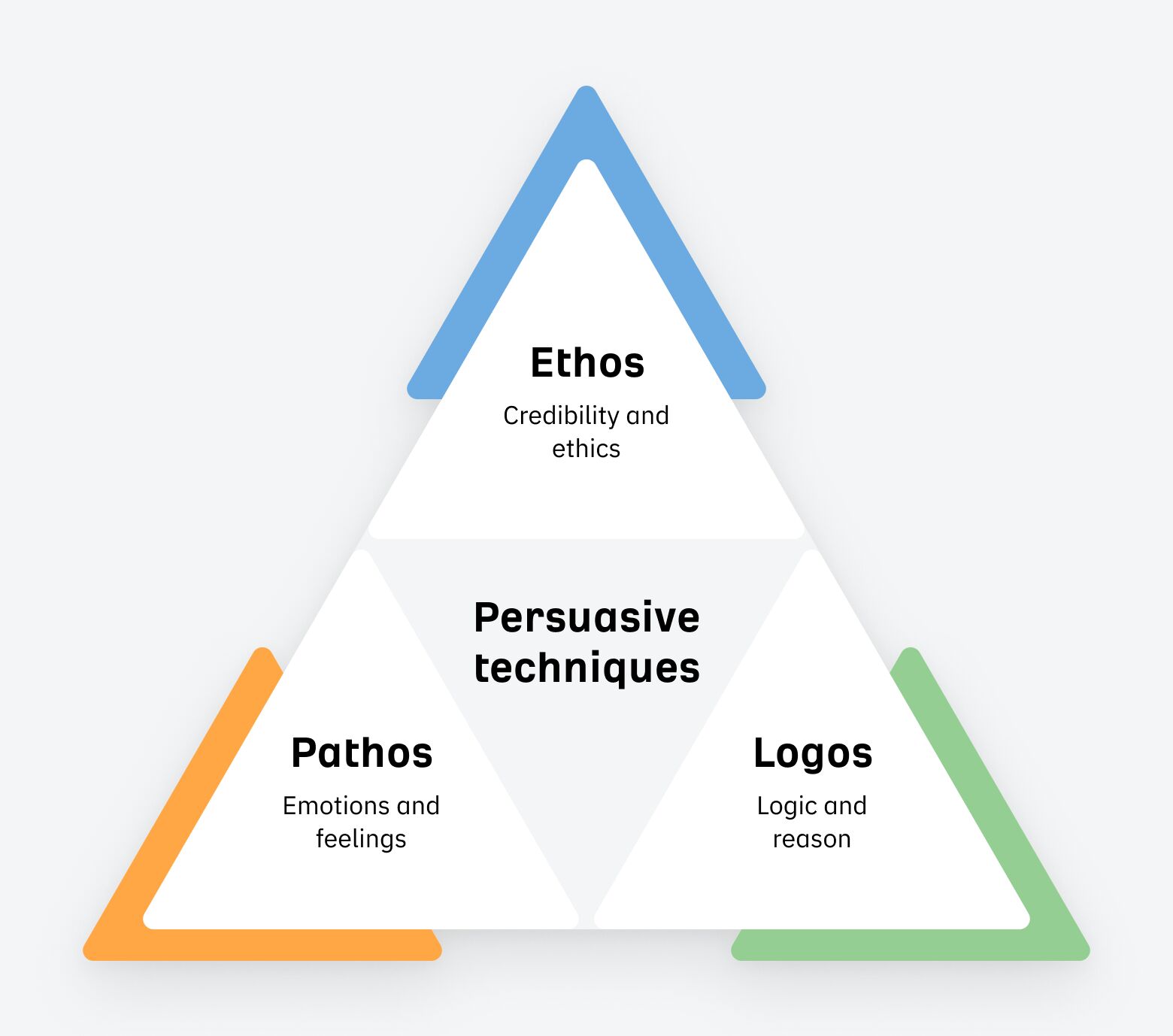

Then sprinkle in language that has a high level of modality:
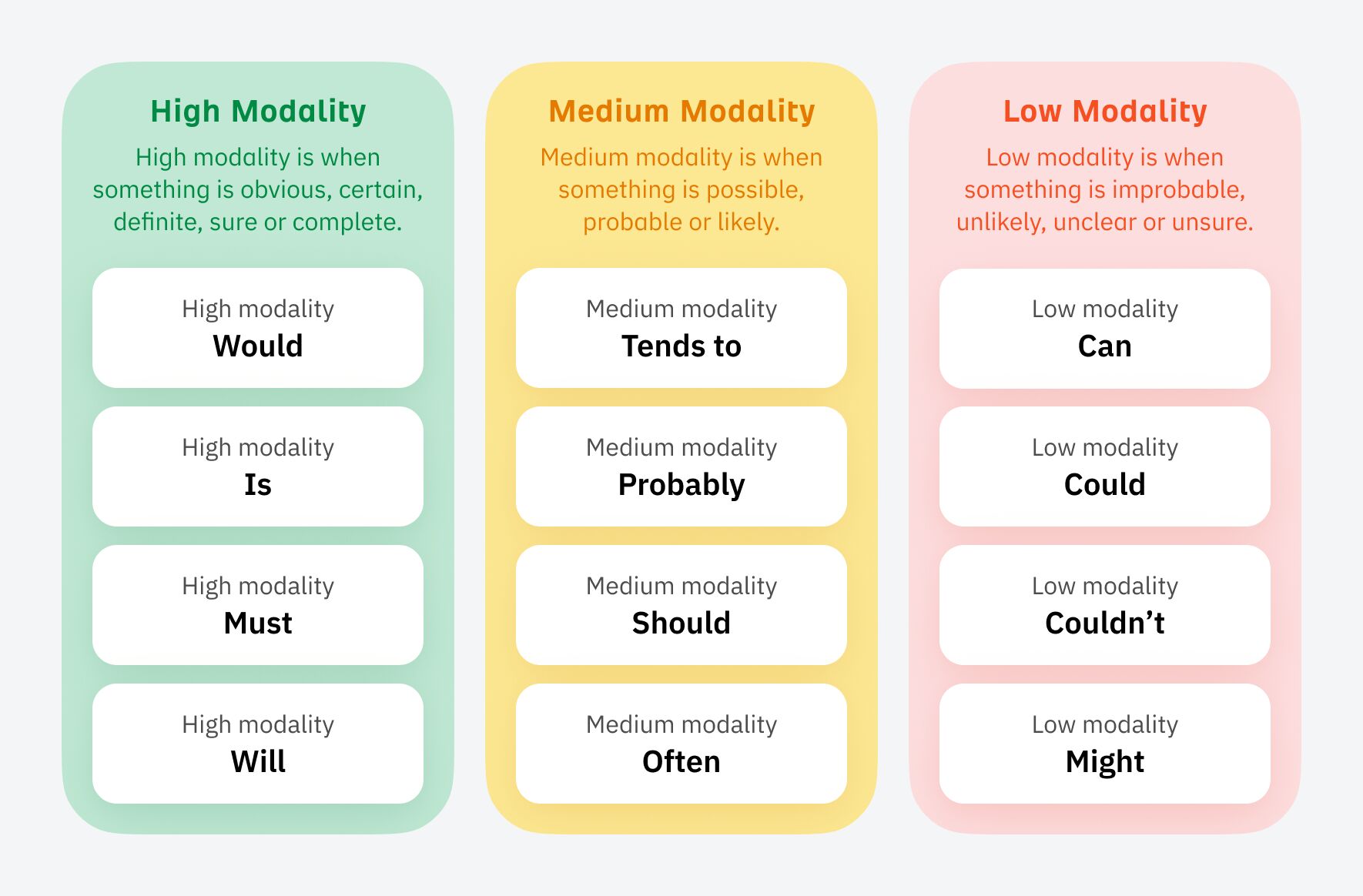

Some people will be able to do this naturally without even realizing it, but for others, it can be an uphill struggle. It wasn’t easy for me, and I had to learn to adapt the way I talked to stakeholders early on.
The strongest way I found was to appeal to emotions and back up with data from a platform like Ahrefs. Highlight what competitors have done in terms of SEO and the results they’ve earned from doing it.
Sidenote.
You don’t have to follow this tip to the letter, but being aware of these concepts means you’ll start to present more confident and persuasive arguments for justifying your SEO strategies.
When I started in SEO, I had zero connections. Getting a job felt like an impossible challenge.
Once I’d got my first SEO Lead job, it felt stupidly easy to get another one—just through connections I’d made along the way in my SEO journey.
I once got stuck on a delayed train with a senior member of staff, and he told me he was really into Google Local Guides, and he was on a certain high level. He said it took him a few years to get there.
Local Guides is part of Google Maps that allows you submit reviews and other user generated content
When he showed me the app, I realized that you could easily game the levels by uploading lots of photos.
In a “hold my beer” moment, I mass downloaded a bunch of photos, uploaded them to Local Guides and equaled his Local Guide level on the train in about half an hour. He was seething.
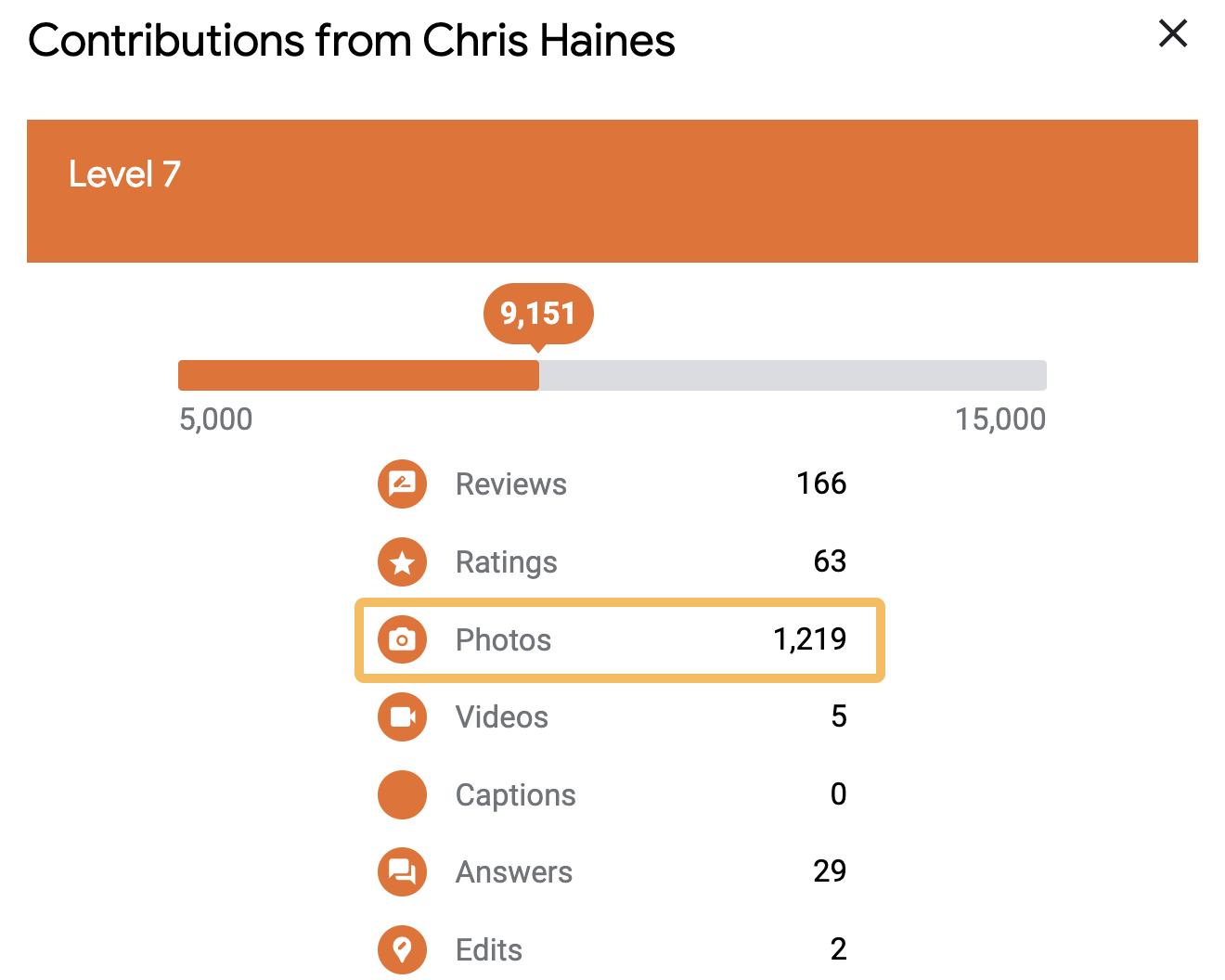

One of the photos I uploaded was a half-eaten Subway. It still amazes me that 50,974 people have seen this photo:
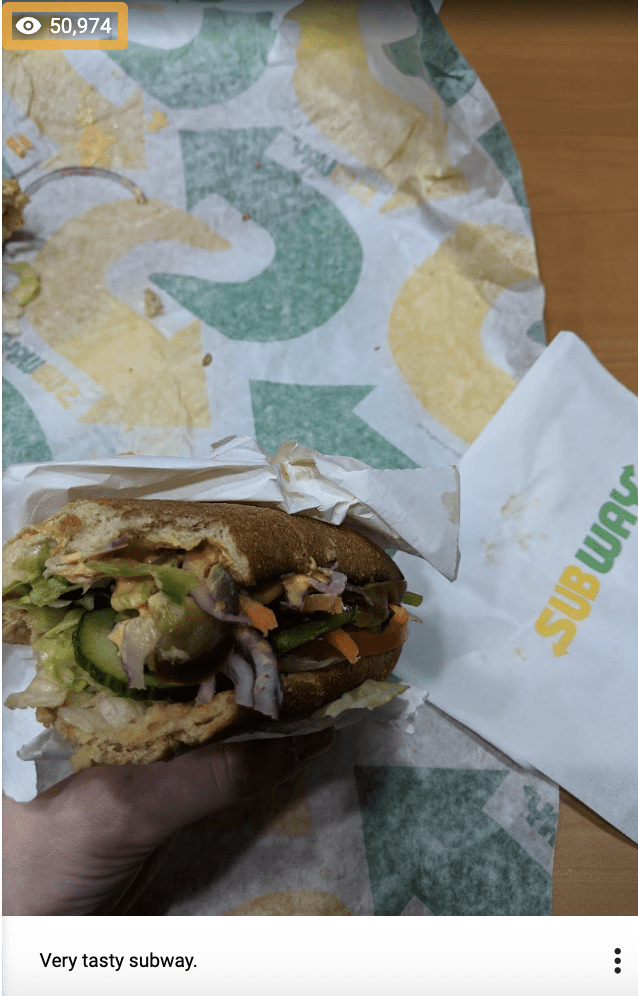

This wasn’t exactly SEO, but the ability to find this ‘hack’ so quickly impressed him, and we struck up a friendship.
The next month that person moved to another company, and then another few months later, he offered me an SEO Lead job.
Tip
Build connections with everyone you can—you never know who you might need to call on next.
Final thoughts
The road to becoming an SEO Lead seems straightforward enough when you start out, but it can quickly become long and winding.
But now armed with my tips, and a bucket load of determination, you should be able to navigate your way to an SEO Lead role much quicker than you think.
Lastly, if you want any more guidance, you can always ping me on LinkedIn. 🙂
-

 PPC4 days ago
PPC4 days ago19 Best SEO Tools in 2024 (For Every Use Case)
-

 PPC7 days ago
PPC7 days ago4 New Google Ads Performance Max Updates: What You Need to Know
-

 MARKETING7 days ago
MARKETING7 days agoWill Google Buy HubSpot? | Content Marketing Institute
-
SEARCHENGINES6 days ago
Daily Search Forum Recap: April 16, 2024
-

 SEO6 days ago
SEO6 days agoGoogle Clarifies Vacation Rental Structured Data
-

 MARKETING6 days ago
MARKETING6 days agoStreamlining Processes for Increased Efficiency and Results
-
SEARCHENGINES5 days ago
Daily Search Forum Recap: April 17, 2024
-

 PPC7 days ago
PPC7 days agoHow to Collect & Use Customer Data the Right (& Ethical) Way















